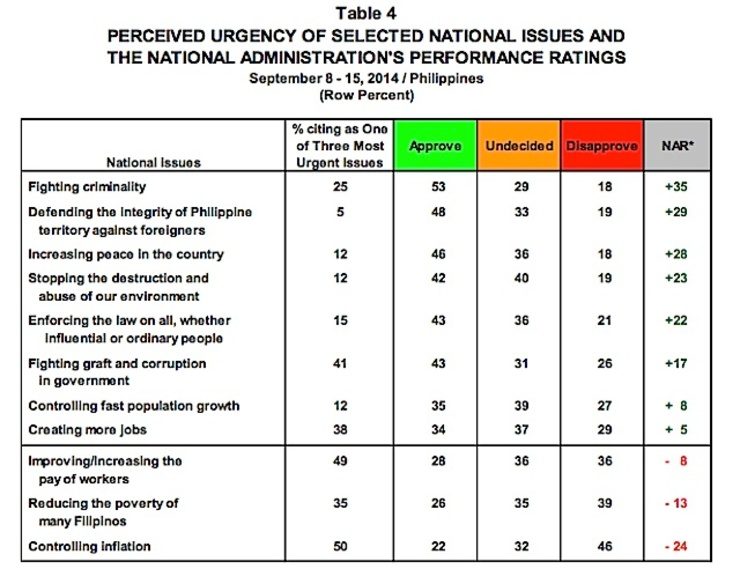SUMMARY
This is AI generated summarization, which may have errors. For context, always refer to the full article.

MANILA, Philippines – Nearly 5 in 10 or half of Filipinos believe that it is “still possible” to wage a successful fight against corruption in government, the results of a recent survey conducted by an independent pollster showed.
The results of the Pulse Asia Research Inc survey conducted from September 8-14 also showed the lowest approval ratings for the Aquino administration in terms of its efforts to control inflation, increase workers’ pay, and reduce poverty.
“Nearly half of Filipinos (48%) are of the view that it is still possible to successfully combat governmental corruption; agreement with this opinion becomes more pronounced between December 2013 and September 2014 (+9 percentage points),” Pulse Asia president Professor Ronald Holmes said in a statement on Thursday, October 9.
The respondents were asked whether they agreed or disagreed with, or were undecided on the statement, “We can still successfully fight the corruption of officials in using public funds.”
Pulse Asia said 28% were undecided on the matter, while 23% disagreed. The most hopeful among geographical groups are from the Balance of Luzon (54%), followed by the National Capital Region (46%), the Visayas (45%), and Mindanao (42%).
Among socioeconomic classes, optimism in fighting corruption in government was highest among the richest Class ABC (54%), followed by Class D (48%), and the poorest Class D (47%).

Holmes said there are no significant changes in public optimism regarding fighting corruption in government between June and September 2014 – from 48% to 45% or a 3-percentage point increase – but the September 2014 rating is 9 percentage points higher than the December 2013 level of 39%.
Lowest score in curbing inflation
In the September survey, the Aquino administration obtained the lowest rating in controlling inflation, which 50% of Filipinos consider the most urgent national concern. Controlling inflation got a disapproval rating of 46% and an approval rating of 22%.
Holmes said that public opinion on administration performance in job creation and increasing workers’ pay is “split 3 ways” at 34% approval, 37% indecision, and 29% disapproval; and 28% approval, 36% indecision, and 36% disapproval, respectively.
He said that among the national issues in the survey, negative public sentiment was most pronounced in government efforts to increase workers’ pay – an 8-percentage point dip in public approval or from 36% in June to 28% in September.
“On the issue of poverty reduction, essentially the same percentages of Filipinos are either critical of the administration’s anti-poverty initiatives or ambivalent on the matter (39% versus 35%),” Holmes said.
The Aquino administration obtained a majority public approval only in the fight against criminality, 53%, which is virtually unchanged from its 54% rating in June 2014.
Holmes said the administration obtained a plurality sentiment in initiatives to defend the country’s territorial integrity against foreigners (48%), promote peace (46%), enforce the rule of law (43%), and fight corruption in government (43%).
He said the government also scored practically the same approval and indecision ratings on its performance on fighting environmental degradation (42% versus 40%), and population control (35% versus 39%).
Urgent national concerns
Asked to rank their top 3 “most urgent” national concerns among 12 issues provided in the survey, 50% of the respondents cited controlling inflation as their most urgent concern, followed by increasing workers’ pay (49%), and fighting graft and corruption in government (41%).
Filipinos are least concerned about defending the integrity of Philippine territory against foreigners (5%), and changing the Constitution (6%).
The survey results also showed that the fourth most urgent concern is creating more jobs (38%), followed by reducing poverty (35%), and fighting criminality (25%).
The other issues are enforcement of the rule of law (15%), promoting peace (12%), controlling population growth (12%), and protecting the environment (12%).
Holmes said that while “levels of concern remain essentially unchanged between June and September 2014,” a different picture emerges based on a year-on-year comparison.
“Year-on-year, one might observe an increase in the level of concern as regards fighting criminality (+8 percentage points) and a decline in the level of concern toward fighting corruption in government (-7 percentage points) and promoting peace in the country (-10 percentage points),” he said.

Among the significant developments from September 2013 to September 2014, are the signing of the Comprehensive Agreement on the Bangsamoro between the government and the Moro Islamic Liberation Front, and the pursuit of plunder and graft charges against lawmakers and other personalities in the pork barrel scam.
Pulse Asia’s September 2014 Nationwide Survey on Urgent National Concerns, National Administration Performance Ratings on Selected Issues, and Possibility of Successfully Combatting Corruption in Government polled 1,200 representative adults.
During the survey period, among the dominant news stories were the Senate probe on the alleged overpriced Makati building which branched into corruption allegations against Vice President Jejomar Binay and his family, and the junking of impeachment complaints against President Benigno Aquino III.
The other issues included the 90-day suspension of Juan Ponce Enrile as senator due to charges stemming from his alleged involvement in the pork barrel scam, Aquino’s transmittal of the draft Bangsamoro Basic Law to Congress, and calls for the resignation of Philippine National Police Director General Alan Purisima over allegations of rising criminality.
Pulse Asia said subnational estimates for each of the geographic areas covered in the survey have a ± 6% error margin, also at a 95% confidence level.
“In keeping with our academic nature, no religious, political, economic, or partisan group influenced any of these processes. Pulse Asia Research undertakes Ulat ng Bayan surveys on its own without any party singularly commissioning the research effort,” it said.
Administration efforts
Reacting to the survey results, Communications Secretary Herminio Coloma Jr welcomed public optimisim towards curbing corruption.
“Citizen involvement is very important in institutionalizing a culture of good governance. So when people are optimistic, when people are involved, and when people participate in government’s efforts to institute a culture of good governance, then this assures us that there is broad-based support for the campaign and this bodes well for good governance in the country,” Coloma told reporters.
He also gave assurances the administration continues to work towards addressing inflation, pointing out the government’s success in decreasing inflation from 4.9% to 4.4%. Coloma said the Bangko Sentral ng Pilipinas continues to monitor the numbers along with the country’s economic managers.
The National Price Coordination Council, Coloma said, is also working “to monitor, track, and regulate the price of important food and basic commodities.”
Coloma also acknowledged the urgent concern of workers for higher pay. He said one of the major constraints in increasing salary scales for government employees is finding the funds for retirement pay and pension benefits of retirees, especially from the Armed Forces.
As for the private sector, he said market forces control salaries, hence the focus on the continous growth of the economy.
“So while the economy is doing well, theoretically, the private companies should be producing more revenues and more substantial cashflows that would enable them to share a greater portion of what they are earning with their workers through salary increases or salary adjustments,” he said. – Rappler.com
Add a comment
How does this make you feel?
There are no comments yet. Add your comment to start the conversation.